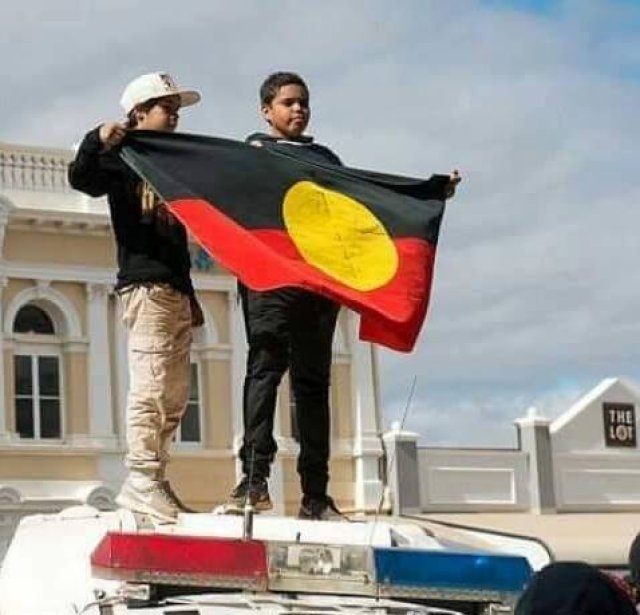
Racism is responsible for the murder of a young boy near Kalgoorlie on August 29.
It is one of several recent examples that demonstrate that the sentiment behind the US #BlackLivesMatter movement is just as relevant in this country.
National attention has focused on the case in large part because hundreds of people protested outside the Kalgoorlie courthouse on August 30. Windows were broken and police cars were damaged — small biscuits compared to the loss of a young boy's life.
Many of the people involved had personal connections to the young victim, Elijah Doughty RIP. They were angry that the perpetrator of the crime was to be charged with manslaughter instead of murder.
The establishment media are calling this action a “riot” instead of the genuine outpouring of emotion by a community sick of both the racism that led to the death and the racism of a “justice” system that frequently lets white perpetrators go free in cases of this kind.
Doughty's aunt, Denise Colbung, told Green Left Weekly that there was a strong current of racist and inhumane posts on two Kalgoorlie Facebook pages in the period immediately leading up to Doughty's murder.
“Feel free to run the oxygen thieves off the road if you see them,” wrote one contributor in response to allegations of motorbike theft.
“Everyone talks about hunting down these sub human mutts, but no one ever does,” another wrote. “We did and caught them,” came the reply. Others argued in favour of an “annual cull” of Aboriginal people.
One community member Jacqueline Spurling told ABC Triple J's Hack on September 1 that her “daughter came back from school saying her friend showed her other posts about how 'let's kill them all now and that way we don't have to deal with them ever again. For generations they won't be able to breed again'.”
After Doughty's death, posters on these two Facebook pages were explicitly endorsing the murder. “Good job you thieving bastard. Don't think you'll be touching another bike anytime soon ahaha. About time someone took it into their own hands hope it happens again.”
There are allegations that Doughty was riding a stolen motorcycle when he was run down, however, it has not been proved that Doughty actually stole it. What is clear is that he had two motorbikes of his own and had himself been a victim of motorcycle theft, which has been rife in Kalgoorlie in recent times.
In any case, no reasonable person can argue that the death penalty should apply to someone riding a stolen bike.
Social media critics accuse the Aboriginal courthouse protesters of carrying out vigilante violence. This follows the lead of State Attorney-General Michael Mischin who called the protesters a “lynch mob”.
However, the real outrage is that the actual vigilante violence was perpetrated by the white driver against Doughty.
Doughty did not die by accident on a street corner in the middle of town. He was chased off a bitumen road down a dirt track by a creek. This is one of several reasons the family have for believing that there was a clear intent to kill and that “murder” is therefore the appropriate description.
Aboriginal activist Shaun Harris told GLW that this is yet another case of “institutional and systemic racism”. He labelled Mischin's comments “insulting and disgraceful”.
Harris is known as a campaigner against Black deaths in custody and is a spokesperson for the campaign for justice for Ms Dhu, the 22 year old who died in police custody relating to unpaid fines.
He told GLW the social media racism in the wake of Doughty's death is comparable to the racism his family endured after the death of his niece.
He said Black people Australia wide have similar experience of racist injustice. “I lost a brother in 1998 to a white drunk driver. We still do not have justice,” he said.
There were three deaths in Doughty's family in the weeks leading up to his death. Colbung told GLW she lost a family member in 2007 when a white driver ran her niece down. No-one was held accountable by the justice system in that case either.
For these reasons, Uncle Sam Watson told a Brisbane rally on September 1 that we need to campaign to “bring pressure to bear on the WA authorities” to ensure that “this guy who has committed this terrible act of murder is going to be prosecuted to the fullest extent of the law”.
“Too often we've seen when Aboriginal people are victims of crime it is very difficult to prosecute these crimes,” he said.
He gave as an example the case of seven police officers who terrorised three Aboriginal youths then left them abandoned in the early hours of the morning in Pinkenba in 1994.
“It took us two years to have those coppers charged. But it took the court only two hours to throw those charges out.”
Like the article? Subscribe to Green Left now! You can also like us on Facebook and follow us on Twitter.